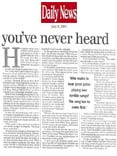His
guitar solos soar with the melody, speed and purpose of the greats from the '60s.
No wonder Eric Clapton, B.B. King and Pink Floyd's Roger Waters have all praised
him. In fact, Clapton did more than fluff Bramhall's ego. After hearing the young musician's obscure 1999 album, "Jellycream," Clapton invited him to play on his CD with B.B. Kjng, "Riding With the King," on which Clapton even covered two Bramhall songs. After, Waters heard the young player's agile fingerings, he asked him to take the lead slot on his solo tour. Then, Clapton invited Bramhall's band, Smokestack, to be the opening act on his current road show. That has allowed Bramhall to promote his latest album, "Welcome," by far his most accomplished to date. On the CD, Bramhall plays with a fever and length seldom heard in this era. This isn't just an exercise in guitar hot-dogging. Bramhall's songs have sturdy melodies, his vocals have soul. "Who wants to hear great guitar playing over terrible songs?" he reasons. "The song has to come first." Also key is the interplay of the band. Far from faceless backup players. Smokestack's musicians give Bramhall the push and pull that made the guys in Cream or the Jimi Hendrix Experience cook. While most of today's wanna-be '60s stars, like Lenny Kravitz or the Black Crowes, sound' like sad knockoffs of classic rock, Bramhall's band sounds authentic. "In this generation, everybody has gotten lazy," the 32-year-old says. "They use pro tools [studio trickery that subs for real musicianship]. And they edit everything down, trying to get that perfect hit that will sell 5 million copies. They're making music for the wrong reasons." It's Bramhall's pure intent, and present-tense passion, that helps his music avoid the retro trap. Then again, he has been preparing for this moment for more than half his life. Bramhall's father played drums for blues legend Lightnin' Hopkins and for the late Stevie Ray Vaughan. The Bramhall and Vaughan families formed a tight clique in their hometown of Austin, Tex. Bramhall senior gave his namesake his first guitar at age 14, and "I pretty much stayed in my room and played for a good six, months before I surfaced," he explains. When he did, the teen found himself jamming with artists 20 and 30 years his senior. They were holdover hippies. He sported a blue Mohawk. In his late teens, Bramhall formed a band with fellow Texas guitarist Charlie Sexton, the Arc Angels, who landed a deal with Geffen Records. Loaded with talent, but also ego and expectations, the group fell apart after their debut, for the usual "Behind the Music" reasons. Bramhall, for one, had developed "an extremely evil drug habit." "I grew up in an alcoholic family and I had a heredity of being afraid of failure and fame and responsibility," he explains. "My dad dropped out because of it." Bramhall got clean for his first solo album,which was produced by ex-Prince associates Wendy and Lisa. But the record bombed and Geffen dropped him. "I was devastated," he says. "They didn't give that album a fair chance." RCA released his second CD, "Jellycream," but Bramhall felt he compromised himself for the project. "I didn't want to fail again. So I got caught up in expectations from the record company, and expectations from fans. I was trying find the quickest route to fame and fortune." When that album didn't click either, Bramhall decided to go with his heart. He had the idea to cut the "Welcome" album live but felt if the record company knew "they'd probably the plug. So I tricked them at first." Bramhall and his producers recorded just two cuts live, then moved up to four and, encouraged by the results, kept going "When we finished and tried to overdub a vocal or guitar part, it sounded like a foreign invader," Bramhall explains. The result was so exciting it convinced RCA to release it that way. In fact, "Welcome" has an immediacy that makes the listener feel like he's right in the middle of the music. Given Bramhall's earlier failures, he credits the superstars who've adopted him with restarting his career and with restoring his battered confidence. "I took a breath," he says, "then realized that if Roger Waters and Eric Clapton and B.B. King and the Vaughan brothers and my dad all think I'm great, then I maybe I am." In
fact, more than maybe. |
 YOU'VE
NEVER HEARD...
YOU'VE
NEVER HEARD...